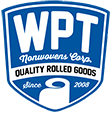One of the best advantages of using nonwoven fabric is that it is highly customizable. This is a very important attribute for specialty applications such as adult diapers and feminine hygiene products. These personal care items require characteristics such as strength, absorbency, and softness on the skin. The nonwoven manufacturing process provides many options for formulating and fabricating a custom material with the features needed for the application.

Nonwoven Fiber Types
Nonwoven fabrics are available in a variety of fiber types including polyester, cotton, rayon, and blended nonwoven fabrics. Whether your end product is a disposable, single-use item, or something that requires a high-strength, durable fabric, nonwovens can provide functional characteristics you need. Qualities such as absorbency, resilience, softness, strength, and elasticity can be achieved with the right fiber type.
American-made, virgin grade nonwoven fabric is the ideal source for applications that demand the highest levels of quality and purity. Virgin grade nonwoven fabric is widely used throughout the medical industry for products such as medical gowns, surgical drapes, and laboratory apparel. Virgin grade nonwoven fabrics are also ideal for hygiene products such as personal care wipes and incontinence care products. The telecommunications industry also uses virgin grade nonwoven fabrics to ensure optimal equipment performance.
Blended nonwoven fabric is well-suited for many applications and available in a variety of combinations including:
- Cotton/Rayon
- Fine Denier Polyester/Course Denier Polyester
- Polyester/Rayon
Nonwoven Fabrication and Treatments
Treatments for nonwoven fabrics options make them highly customizable for a wide range of applications and products. Nonwovens can be created in a variety of colors, textures, and thicknesses. They may also be developed to be sterile, liquid repellent, anti-bacterial, and flame retardant.
Binder resins options allow for the development of nonwoven fabric to meet highly specialized needs such as:
- Acrylics
- Vinyl Acetate (VAC)
- Vinyl Acrylics
- Ethylene Vinyl Acetate (EVA)
- Styrene Butadiene Rubber (SBR)
- Starch
- Poly Vinyl Chloride (PVC)
Converting Nonwovens
Having nonwovens converted into the size and shape needed for the application before delivery will greatly enhance efficiency in the development of an end product. Some nonwoven suppliers offer inline slitting and winding capabilities, eliminating the need for third party conversion services, making nonwovens an efficient and cost-effective option.
WPT Nonwovens Advantages
If you’re looking for a quality, dependable source for nonwoven fabric, WPT Nonwovens offers buyers many advantages as their nonwoven fabric supplier including:
- Advanced facilities that provide full capabilities to handle quick-change challenges
- Nonwoven fabric samples delivered within 30 days
- Ability to schedule and run new and innovative trials quickly and efficiently
- Ability to affordably serve the needs of small quantity niche buyers as well as large quantity customers
- Dependable on-time delivery in four to six weeks
We are happy to serve order size and are committed to providing excellent nonwoven fabrics, along with full customer support and services!

